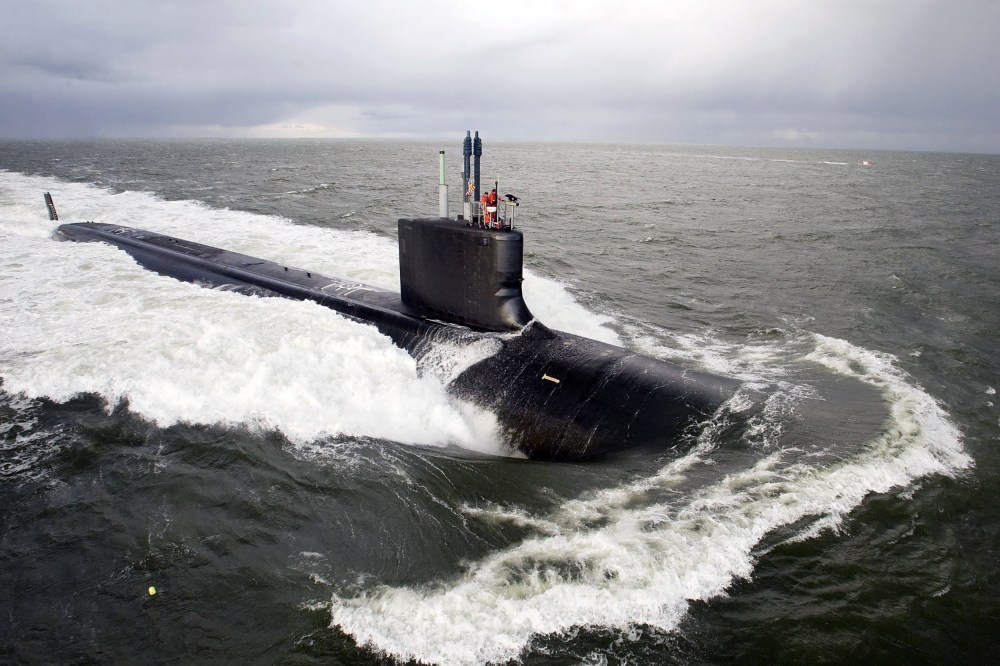On Saturday, a Navy nuclear engineer and his wife were arrested in West Virginia by the FBI and accused of attempting to pass extremely sensitive secrets about submarine technology to another country in violation of the Atomic Energy Act. Jonathan and Diana Toebbe of Maryland are charged with contacting a foreign nation, offering cutting-edge secrets about American nuclear-powered submarines and then engaging in multiple clandestine exchanges of classified information with undercover FBI agents in return for $100,000 in cryptocurrency.
Some of the restricted data the couple are accused of trying to sell includes the nuclear propulsion system of Virginia-class fast attack submarines.
Some of the restricted data the couple are accused of trying to sell was information about the nuclear propulsion system of Virginia-class fast attack submarines, the technology at the heart of a recent deal the U.S. and the United Kingdom struck with Australia. It’s the kind of technology that gives the U.S. a crucial edge over adversaries in the race for quieter, less detectable submarines and warships. According to the criminal complaint, each Virginia-class submarine costs about $3 billion and includes the latest in stealth and weapons systems technology. And it’s the kind of advanced military secret that nations such as China and Russia would pay just about anything for.
The court documents unsealed Sunday tell a strange, almost bemusing story of the Toebbes’ use of encrypted communications, their apologies for poor language translations, their anxiety over selecting “dead drop” locations along wooded nature trails and their secreting small digital SD cards loaded with classified data inside Band-Aid packages and chewing gum wrappers and even between slices of bread in half a peanut butter sandwich. It’s quite an account — but it’s not the whole story. Mysteries remain, including four questions that, because of the classified nature of espionage cases, may never be publicly answered.
First: Why would Jonathan Toebbe — a nuclear propulsion engineer with high-level clearances and a stint working for the chief of naval operations — give it all up, betray his country and risk lifetime imprisonment? And why, in a highly unusual spy couple scenario, would his wife, Diana — a history and English teacher — be his partner in crime?

FBI behavioralists have extensively interviewed and studied virtually every American convicted of espionage in an initiative called “Project Slammer.” They identified certain commonalities and traits associated with spies, including ego, a sense of grievance and anti-social personality. Interestingly, the more obvious motivator of financial greed plays less of a role than we might think. As the Toebbe case unfolds, we might get some glimpse into why, collectively as a couple, the government believes they decided to risk it all. This question of “why” goes far beyond mere curiosity. If we can crack the code of the nuanced human indicators and warning signs of would-be spies, we might be able to prevent serious national security damage.
Second: What happened during a mysterious gap of more than eight months between the unidentified country’s receiving what the government says the Toebbes offered — reportedly a package sent in the mail — and that government’s reporting it to the FBI? The criminal complaint states:
“On or about December 20, 2020, the FBI’s attaché (“LEGAT”) in COUNTRY1 obtained a package representatives from COUNTRY1 had received in April 2020 through a mail carrier from the U.S. by an unidentified subject in an attempt to establish a covert relationship. The package contained U.S. Navy documents, a letter containing instructions, and an SD card containing specific instructions on how COUNTRY1 should respond using an encrypted communication platform, and additional documents.
“The package that contained the material described above was a brown envelope with four U.S. postage stamps, a postal barcode, and a sent date of April 1, 2020.”
If the Toebbes were trying to become spies, was this their first and only attempt?
April to December is a long time for a foreign nation to possess and analyze classified U.S. nuclear propulsion data. What did it do with it? Why did it get passed to the FBI’s representative in that country instead of being passed between respective leadership in Washington? Did the coronavirus pandemic play some role in the delay? Does the criminal complaint contain the entire story? Almost certainly not.
Third: If the Toebbes were trying to become spies, was this their first and only attempt? The complaint raises serious doubts. For example, the court document alleges that in one encrypted foreign-language communication from Toebbe to the FBI undercover agent, he reveals:
“This information was slowly and carefully collected over several years in the normal course of my job to avoid attracting attention and smuggled past security checkpoints a few pages at a time.”













